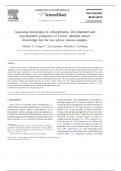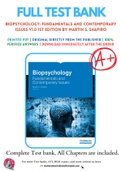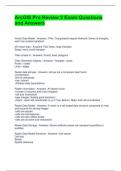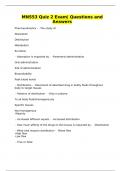Psychiatry Research 151 (2007) 87 – 95
www.elsevier.com/locate/psychres
Assessing knowledge of schizophrenia: Development and
psychometric properties of a brief, multiple-choice
knowledge test for use across various samples
Michael T. Compton ⁎, Luis Quintero, Michelle L. Esterberg
Emory University School of Medicine, Department of Psychiatry and Behavioral Sciences, Atlanta, Georgia, USA
Received 19 September 2005; received in revised form 21 April 2006; accepted 15 May 2006
Abstract
Psychosocial research on schizophrenia would benefit from reliable and valid measures of knowledge about schizophrenia.
Although a variety of instruments have been developed to assess the effects of specific family psychoeducational programs, little
research has been conducted on the psychometric properties of scales measuring knowledge about schizophrenia. This study
assessed reliability and validity of a brief, easily administered, multiple-choice knowledge test completed by 441 participants from
several samples: 144 lay community members, 77 family members of inpatients with schizophrenia, 170 police officers involved in
a training program on mental illnesses, and 50 mental health professionals. After item analysis, good internal consistency reliability
and construct validity were demonstrated for an 18-item version of this test. The findings demonstrate that knowledge about
schizophrenia – a construct with potentially broad applicability in psychosocially oriented schizophrenia research – can be
assessed with brief, self-administered, multiple-choice knowledge tests.
© 2006 Elsevier Ireland Ltd. All rights reserved.
Keywords: Family members; Knowledge test; Lay public; Police officers; Schizophrenia
1. Introduction toward individuals with schizophrenia. For example, a
researcher might ask, “Is a primary caregiver's level of
One's level of knowledge about schizophrenia is a knowledge about schizophrenia associated with delays in
construct that has potential applicability in several areas of seeking treatment for the first episode of a psychotic
psychosocial research related to schizophrenia. As an disorder?” or, “In the lay public, is stigma toward indi-
independent variable, knowledge about schizophrenia can viduals with schizophrenia partly driven by one's level of
be studied as a determinant of help-seeking, a predictor of knowledge about the illness?” Indeed, recent years have
treatment engagement and adherence among patients and witnessed increasing research interest on delays in
family members, or as a correlate of attitudes and stigma seeking treatment (Lincoln et al., 1998; Compton et al.,
2004; Norman et al., 2004; Thompson et al., 2004) as well
as on strategies to diminish the impact of stigma on
⁎ Corresponding Author. Emory University School of Medicine,
individuals with severe mental illnesses (Corrigan and
Department of Psychiatry and Behavioral Sciences, 49 Jesse Hill Jr.
Drive, S.E., Room #333 Atlanta, GA 30303 USA. Tel.: +1 404 778
Penn, 1999; Angermeyer et al., 2004). Knowledge about
1486; fax: +1 404 616 3241. schizophrenia is a construct that clearly could inform such
E-mail address: mcompto@emory.edu (M.T. Compton). research topics. As a dependent variable, knowledge
0165-1781/$ - see front matter © 2006 Elsevier Ireland Ltd. All rights reserved.
doi:10.1016/j.psychres.2006.05.019
, 88 M.T. Compton et al. / Psychiatry Research 151 (2007) 87–95
about schizophrenia is assessed as an outcome of psy- 1987; Harrison et al., 1998; De Groot et al., 2003),
choeducational programs for patients and family mem- Canada (Posner et al., 1992), Denmark (Merinder et al.,
bers. Research questions also might include, “Does a 1999), Finland (Stengård, 2003), Ireland (Cassidy et al.,
public educational campaign enhance lay community 2001), Italy (Cazzullo et al., 1989), Spain (Canive et al.,
members' knowledge about schizophrenia?” or, “Do 1996; Montero et al., 1999), the United Kingdom (Smith
police officers demonstrate enhanced knowledge about and Birchwood, 1987; Sellwood et al., 2003), and the
schizophrenia after a training program on responding to United States (McGill et al., 1983; Mueser et al., 1997).
individuals with mental illnesses?” Yet, these instruments typically have been used in single
Despite its potential relevance, few studies address studies or within a specific research group and psy-
levels of knowledge about schizophrenia, and very few chometric results rarely have been reported. Aside from
instruments exist to measure this variable. Several scales, outcome studies of psychoeducational programs for fa-
however, have been developed to measure knowledge mily members, relatively little research has assessed
about schizophrenia among caregivers, usually to test the knowledge about schizophrenia, and minimal work has
effects of specific psychoeducational programs. For been conducted on developing instruments to measure
example, Barrowclough and colleagues (1987) devel- this aspect of mental health literacy. In general, there
oped the Knowledge about Schizophrenia Interview exists a lack of easily administered, psychometrically-
(KASI) to assess the functional value of relatives' know- sound instruments that measure knowledge about schi-
ledge about schizophrenia, as part of a study of psycho- zophrenia and that can be applied to a wide variety of
logical interventions in families that included an settings and populations.
educational component. The KASI, studied in 24 re- Due to this dearth of available knowledge measures,
latives, was scored based on an audiotaped interview scales assessing level of knowledge about schizophrenia
focusing not only on the presence or absence of know- are needed due to potential applicability in several areas of
ledge about schizophrenia, but the effects of that schizophrenia research, and the psychometric properties
information on the relative's behavior toward the patient of such instruments should be studied and reported. Be-
(Barrowclough et al., 1987). Six sections (diagnosis, cause of the very limited research on measurement of
symptoms, etiology, medication, course and prognosis, knowledge about schizophrenia, especially in populations
and management) were structured mostly to require other than family members, this study assesses the psy-
“yes/no/don't know” responses, and the interviewer chometric properties (internal consistency reliability and
rated responses according to how the knowledge level construct and criterion validity) of a multiple-choice
affected the relative's interactions with the patient. knowledge test designed to be used in a wide variety of
Another instrument is the 14-item Knowledge of settings and with a number of populations, including lay
Schizophrenia (KOS) true/false questionnaire developed community members, family members, police officers,
to measure knowledge among caregivers in Taiwan and mental health professionals.
(Yang et al., 1999). This instrument assesses caregivers'
knowledge of symptoms, causes, treatment, and com- 2. Methods
munity rehabilitation. The Knowledge about Schizophre-
nia Questionnaire (KASQ) developed by Ascher- 2.1. Development of the test
Svanum (1999), is a 25-item multiple-choice test that
assesses patients' knowledge about their illnesses and A multiple-choice test, termed the Knowledge About
treatments. Items of the KASQ cover domains including Schizophrenia Test (KAST), was designed initially to
diagnosis and prevalence, etiology, course, prognosis, measure knowledge about schizophrenia among family
medications and side effects, non-medication treatments, members of patients hospitalized for a first episode of a
stress factors, and legal issues. Though there has been schizophrenia-spectrum disorder. Due to the need for a
very limited reporting of the psychometric properties of measure of knowledge about schizophrenia in other
other schizophrenia knowledge instruments, psychomet- samples, the instrument then was used in surveys that
ric testing of the KASQ in 136 inpatients with included individuals from the lay community (Esterberg
schizophrenia and schizoaffective disorder demonstrated et al., submitted for publication), and police officers
its reliability and validity (Ascher-Svanum, 1999). participating in Crisis Intervention Team (CIT) training
A variety of other knowledge scales have been deve- (Compton et al., 2006). Thus, three simultaneous
loped for use in studies of caregiver characteristics and projects were being conducted that included assessing
specific family psychoeducational programs in various knowledge about schizophrenia, involving several
countries, including Australia (Pakenham and Dadds, groups of participants. The present analysis used all







